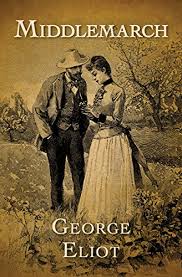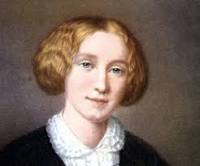Middlemarch Page #14
Middlemarch, A Study of Provincial Life is a novel by the English author George Eliot, appearing in eight instalments in 1871 and 1872. Set in a fictitious Midlands town from 1829 to 1832, it follows distinct, intersecting stories with many characters.
Dorothea was in fact thinking that it was desirable for Celia to know of the momentous change in Mr. Casaubon’s position since he had last been in the house: it did not seem fair to leave her in ignorance of what would necessarily affect her attitude towards him; but it was impossible not to shrink from telling her. Dorothea accused herself of some meanness in this timidity: it was always odious to her to have any small fears or contrivances about her actions, but at this moment she was seeking the highest aid possible that she might not dread the corrosiveness of Celia’s pretty carnally minded prose. Her reverie was broken, and the difficulty of decision banished, by Celia’s small and rather guttural voice speaking in its usual tone, of a remark aside or a “by the bye.” “Is any one else coming to dine besides Mr. Casaubon?” “Not that I know of.” “I hope there is some one else. Then I shall not hear him eat his soup so.” “What is there remarkable about his soup-eating?” “Really, Dodo, can’t you hear how he scrapes his spoon? And he always blinks before he speaks. I don’t know whether Locke blinked, but I’m sure I am sorry for those who sat opposite to him if he did.” “Celia,” said Dorothea, with emphatic gravity, “pray don’t make any more observations of that kind.” “Why not? They are quite true,” returned Celia, who had her reasons for persevering, though she was beginning to be a little afraid. “Many things are true which only the commonest minds observe.” “Then I think the commonest minds must be rather useful. I think it is a pity Mr. Casaubon’s mother had not a commoner mind: she might have taught him better.” Celia was inwardly frightened, and ready to run away, now she had hurled this light javelin. Dorothea’s feelings had gathered to an avalanche, and there could be no further preparation. “It is right to tell you, Celia, that I am engaged to marry Mr. Casaubon.” Perhaps Celia had never turned so pale before. The paper man she was making would have had his leg injured, but for her habitual care of whatever she held in her hands. She laid the fragile figure down at once, and sat perfectly still for a few moments. When she spoke there was a tear gathering. “Oh, Dodo, I hope you will be happy.” Her sisterly tenderness could not but surmount other feelings at this moment, and her fears were the fears of affection. Dorothea was still hurt and agitated. “It is quite decided, then?” said Celia, in an awed under tone. “And uncle knows?” “I have accepted Mr. Casaubon’s offer. My uncle brought me the letter that contained it; he knew about it beforehand.” “I beg your pardon, if I have said anything to hurt you, Dodo,” said Celia, with a slight sob. She never could have thought that she should feel as she did. There was something funereal in the whole affair, and Mr. Casaubon seemed to be the officiating clergyman, about whom it would be indecent to make remarks. “Never mind, Kitty, do not grieve. We should never admire the same people. I often offend in something of the same way; I am apt to speak too strongly of those who don’t please me.” In spite of this magnanimity Dorothea was still smarting: perhaps as much from Celia’s subdued astonishment as from her small criticisms. Of course all the world round Tipton would be out of sympathy with this marriage. Dorothea knew of no one who thought as she did about life and its best objects. Nevertheless before the evening was at an end she was very happy. In an hour’s tête-à-tête with Mr. Casaubon she talked to him with more freedom than she had ever felt before, even pouring out her joy at the thought of devoting herself to him, and of learning how she might best share and further all his great ends. Mr. Casaubon was touched with an unknown delight (what man would not have been?) at this childlike unrestrained ardor: he was not surprised (what lover would have been?) that he should be the object of it. “My dear young lady—Miss Brooke—Dorothea!” he said, pressing her hand between his hands, “this is a happiness greater than I had ever imagined to be in reserve for me. That I should ever meet with a mind and person so rich in the mingled graces which could render marriage desirable, was far indeed from my conception. You have all—nay, more than all—those qualities which I have ever regarded as the characteristic excellences of womanhood. The great charm of your sex is its capability of an ardent self-sacrificing affection, and herein we see its fitness to round and complete the existence of our own. Hitherto I have known few pleasures save of the severer kind: my satisfactions have been those of the solitary student. I have been little disposed to gather flowers that would wither in my hand, but now I shall pluck them with eagerness, to place them in your bosom.” No speech could have been more thoroughly honest in its intention: the frigid rhetoric at the end was as sincere as the bark of a dog, or the cawing of an amorous rook. Would it not be rash to conclude that there was no passion behind those sonnets to Delia which strike us as the thin music of a mandolin? Dorothea’s faith supplied all that Mr. Casaubon’s words seemed to leave unsaid: what believer sees a disturbing omission or infelicity? The text, whether of prophet or of poet, expands for whatever we can put into it, and even his bad grammar is sublime. “I am very ignorant—you will quite wonder at my ignorance,” said Dorothea. “I have so many thoughts that may be quite mistaken; and now I shall be able to tell them all to you, and ask you about them. But,” she added, with rapid imagination of Mr. Casaubon’s probable feeling, “I will not trouble you too much; only when you are inclined to listen to me. You must often be weary with the pursuit of subjects in your own track. I shall gain enough if you will take me with you there.” “How should I be able now to persevere in any path without your companionship?” said Mr. Casaubon, kissing her candid brow, and feeling that heaven had vouchsafed him a blessing in every way suited to his peculiar wants. He was being unconsciously wrought upon by the charms of a nature which was entirely without hidden calculations either for immediate effects or for remoter ends. It was this which made Dorothea so childlike, and, according to some judges, so stupid, with all her reputed cleverness; as, for example, in the present case of throwing herself, metaphorically speaking, at Mr. Casaubon’s feet, and kissing his unfashionable shoe-ties as if he were a Protestant Pope. She was not in the least teaching Mr. Casaubon to ask if he were good enough for her, but merely asking herself anxiously how she could be good enough for Mr. Casaubon. Before he left the next day it had been decided that the marriage should take place within six weeks. Why not? Mr. Casaubon’s house was ready. It was not a parsonage, but a considerable mansion, with much land attached to it. The parsonage was inhabited by the curate, who did all the duty except preaching the morning sermon.
Translation
Translate and read this book in other languages:
Select another language:
- - Select -
- 简体中文 (Chinese - Simplified)
- 繁體中文 (Chinese - Traditional)
- Español (Spanish)
- Esperanto (Esperanto)
- 日本語 (Japanese)
- Português (Portuguese)
- Deutsch (German)
- العربية (Arabic)
- Français (French)
- Русский (Russian)
- ಕನ್ನಡ (Kannada)
- 한국어 (Korean)
- עברית (Hebrew)
- Gaeilge (Irish)
- Українська (Ukrainian)
- اردو (Urdu)
- Magyar (Hungarian)
- मानक हिन्दी (Hindi)
- Indonesia (Indonesian)
- Italiano (Italian)
- தமிழ் (Tamil)
- Türkçe (Turkish)
- తెలుగు (Telugu)
- ภาษาไทย (Thai)
- Tiếng Việt (Vietnamese)
- Čeština (Czech)
- Polski (Polish)
- Bahasa Indonesia (Indonesian)
- Românește (Romanian)
- Nederlands (Dutch)
- Ελληνικά (Greek)
- Latinum (Latin)
- Svenska (Swedish)
- Dansk (Danish)
- Suomi (Finnish)
- فارسی (Persian)
- ייִדיש (Yiddish)
- հայերեն (Armenian)
- Norsk (Norwegian)
- English (English)
Citation
Use the citation below to add this book to your bibliography:
Style:MLAChicagoAPA
"Middlemarch Books." Literature.com. STANDS4 LLC, 2024. Web. 24 Nov. 2024. <https://www.literature.com/book/middlemarch_242>.




Discuss this Middlemarch book with the community:
Report Comment
We're doing our best to make sure our content is useful, accurate and safe.
If by any chance you spot an inappropriate comment while navigating through our website please use this form to let us know, and we'll take care of it shortly.
Attachment
You need to be logged in to favorite.
Log In